The State of the Union: How Gen Z and Millennials View Marriage, According to Data
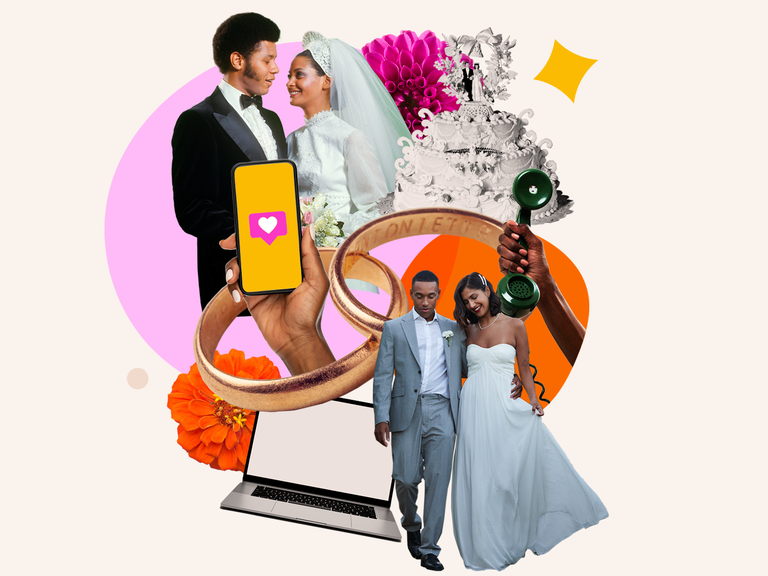
On an average weekend morning in lower Manhattan, 20-and- 30-somethings clad in athleisure are seated or waiting in line for their coffee orders. Most stare down at devices, scrolling, swiping or texting. The age of technology has caught up to the first generation that grew up with iPhones—Gen Z—and it's influenced how they interact with the world. Relationships included.
Since 2019, dating apps have been the most popular way engaged couples meet. Historically, people most often found marriage prospects within their community, through mutual friends, at a restaurant, bar or coffee shop, or at work or school. Yet the last decade has seen an evolution in dating habits: 28 percent of all to-be-weds are now swiping, vetting and engaging with potential partners online. Seventy-five percent of couples still meet through other mediums, but societal dating and marital habits have evolved as people have become increasingly reliant on technology.
Another story is playing out for millennials, many of whom experienced the shift from dial-up internet to high-speed Wi-Fi and were among the beta testers of dating apps.
There are more single people over 40 than ever before. In 2021, a quarter of 40-year-olds in the US had never been married, up from 20 percent in 2010 and 6 percent in 1980. Of course, this is due to multiple factors. Women are more highly educated. Behavioral scientists state that single women over 30 without children are the happiest subset of people in the country. A groundbreaking recent report found that young and middle-aged men are getting lonelier, which is influenced by dating app usage as well as high standards for relationships. Whereas marriage was once viewed as protecting women, with the man providing legal and financial support, such outdated views are dissipating. To add to the dialogue, marriage rights aren't guaranteed for certain communities, especially LGBTQIA+ couples as of late. (In July 2023, the Supreme Court set a new precedent after ruling that a Colorado website designer could deny services to gay couples based on her religious beliefs.)
The question now remains: is marriage still relevant? In The Knot Worldwide Future of Marriage Report (conducted in June 2023 among 1,000 survey respondents), sentiments about marriage depend on your generation and life stage. Many have speculated whether the next generation of couples would render marriage obsolete, but the study's findings reflect a different outlook.
Among Gen Z* respondents, 81% are open to the possibility of getting married, with one in two saying they "definitely" see it happening. In fact, the feelings related to marriage were exciting (66 percent) and anticipatory (72 percent). Only 8% expressed the belief that marriage is "outdated."
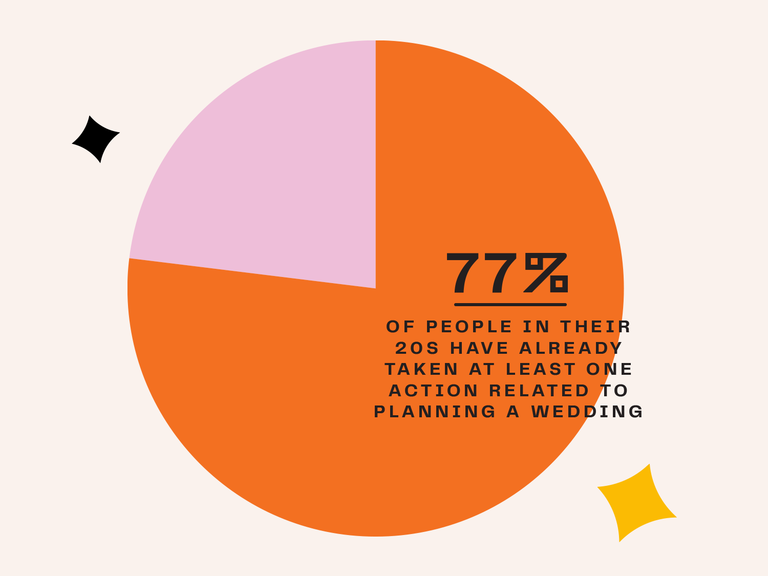
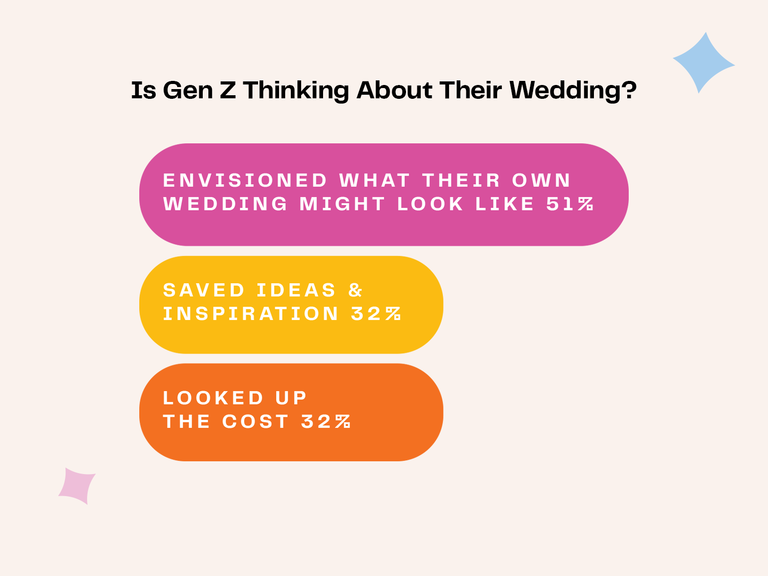
There appears to be a growing dichotomy in marital perceptions between Gen Z and millennials. As people get older, our data shows that those who are single start to feel less strongly about the idea of marriage.
"Every generation of young people has to figure out what they want from life," says Charles T. Hill, PhD, a professor of psychology at Whittier College. "Often, there are expectations of getting married and having children to please parents, to meet an individual's personal needs, to prove their adult and sexual identities. Even to confirm that they are desirable to others. Each has to figure out who they are and who they want to be."
Why Gen Z and Millennials View Marriage Differently
The biggest reason is a difference in life stages and experiences. "People in their 30s and 40s have gone through a period of [many] social changes," says Norman B. Epstein, PhD, who oversaw the Couple and Family Therapy master's program at the University of Maryland for over three decades. "For example, there are more women than men in college [and grad school], and career opportunities have expanded. There are more people in that age group who've actually delayed looking for a life partner, because they were busy with their education." Priorities have shifted for women in particular.
The other influential factor is a person's identity, including self-confidence and self-awareness. "For people who are older, singlehood can be validating. Many single people are confident and independent, and going alone can boost self-esteem," says Epstein. "It depends how people think about it."
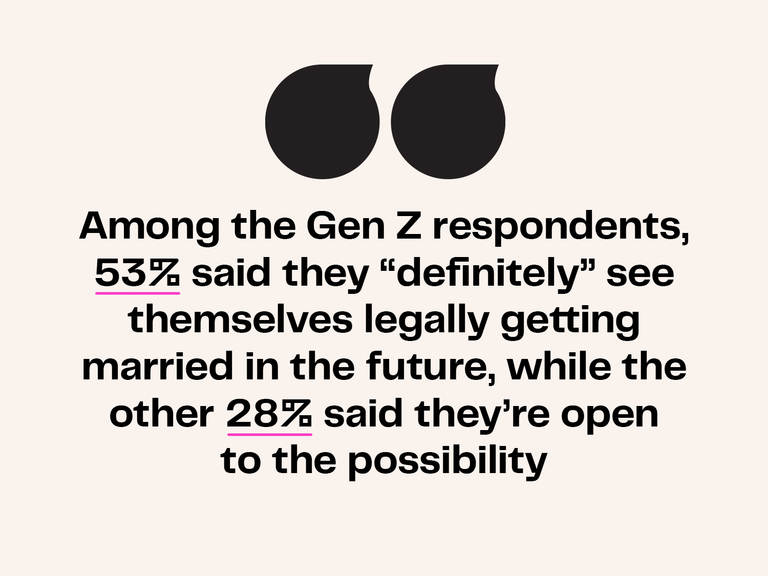
On the other hand, some individuals might feel insecure about their singlehood. "They might think, 'I should be married. Is something wrong me?' That obviously can lower self-esteem. On the flip side, a person can say, 'Wow, I'm a whole person by myself and I have strengths. Other people like me. It's not like I'm a hermit or an outcast.' Marriage is not the only way to get validation and support."
Hill argues that the desire to marry also may be tainted by the ongoing economic, political and social climate. "Some may be concerned about being able to support a spouse and children or the marriage not working out," he says. "Some may be concerned about the future state of the world regarding climate change, inflation and political division, especially in regard to bringing children into the world. Others may be concerned about attracting a spouse due to social comparison."
What Social Media Is Doing
As Theodore Roosevelt said, "Comparison is the thief of joy." While social media comes with its benefits (community, connection and inspiration), it can also fuel comparisons across careers, lifestyles and relationships. "I have an issue with social media for that reason," says Epstein, who points to curated moments on social media. "It's a risk factor when people go on social media and start to think about others in wonderful relationships. It isn't so good for the mind. For example, when you're at a restaurant, it looks like all the other couples are having a fine time together. You might think, 'They must be doing great.' Yet we don't know what they do when they go home and when they're not in a restaurant."
Hill points to society's reliance on dating apps and social media platforms, which create grounds for comparison. In his book Intimate Relationships Across Cultures, Hill found that the approval of parents and friends is one of the factors that predicted relationship satisfaction and commitment. Social media had nothing to do with the quality of the relationship between partners.
The Grass Is Greener...or Is It?
Comparisons also influence that inexhaustible conversation about singlehood vs. married life: Which is better? The grass may appear greener from one perspective or, even worse, people may cast judgment on the other side. Researchers and experts say the answer is subjective: It boils down to your needs and priorities. Both come with a slew of benefits.
If you're single: "There's less responsibility for meeting the needs of a spouse, and coordinating living together and reducing conflict," says Hill. "Plus, there's less responsibility for raising any children that may result. Those who are single have more freedom to do what they want when they want, like a career or leisure activities, or to play the field without commitments."
Marriage also comes with psychological benefits—and some legal and tax perks too. "Marriage increases the likelihood of having someone you can count on to meet psychological needs, such as someone to talk to, do things with or share affection with," says Hill. "A spouse may help support you financially, and help you have and raise children. Marriage also provides legal benefits, such as financial rights if you divorce, parental rights if you have children, visitation rights if you are hospitalized." This is one reason why family lawyers encourage you to get a prenuptial agreement, as it gives you documentation protecting both parties in the best case scenario.
Doing It Differently
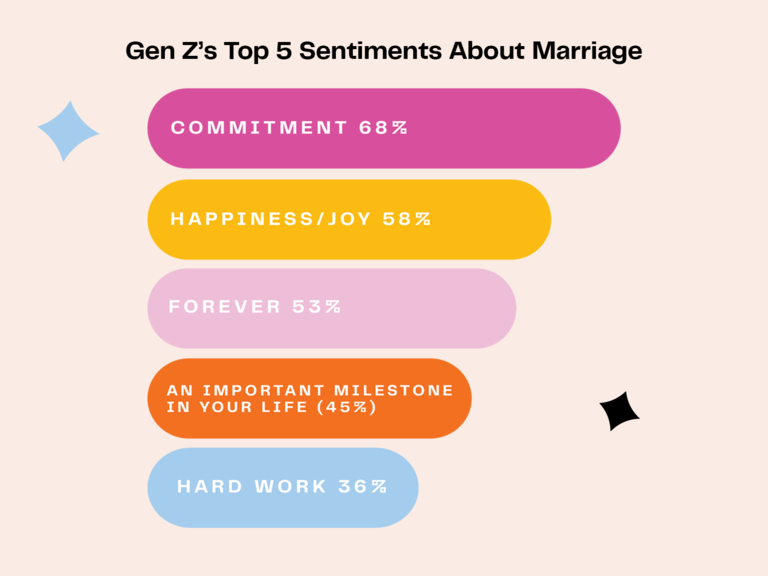
To be clear, a loving relationship is different from a marriage. Nontraditional couples, some in lifelong partnerships, have shirked the formal marriage process. For example, Goldie Hawn and Kurt Russell have been together since 1983. Both were married previously, and after their own experiences with divorce, they decided it was a better financial decision to avoid the legal process. While Hawn and Russell are among the more visible couples who've decided to go this route, our study found that millennial and Gen Z respondents widely accept nontraditional partnerships.
A possible future trend is couples throwing a celebration to mark their partnership, without signing the marriage certificate. The study discovered that nearly half of Gen Z respondents who don't plan to marry still anticipate throwing a party to celebrate their relationship; 36 percent of millennials plan the same. Regardless of whether they plan to marry, most Gen Z respondents said they would throw a party in honor of the relationship.
Still, the majority of Gen Zers and millennials still prioritize finding a lifelong partner—and they're doing it with care. "My research reveals that personality is the most important factor," says Hill. "Having similar values, attitudes and interests matter, so you have something to talk about and things to do together, besides being physically intimate."
Ever connected, Gen Z is catching on. A recent study discovered that young people are having less sex than their counterparts in past decades. While this is influenced by a range of factors, the greatest is that Gen Z's focus on self-care and mental wellbeing has shifted attitudes about casual hookups. "Physical attractiveness is not as important as people think," says Hill. "It plays a role in initial meeting, but so does intelligence and especially personality." He brings up the Boston Couples Study, a longitudinal study of couples who dated in college, that found that ratings of physical attractiveness did not predict whether a couple would stay together for two years or if they'd be married 15 years later.
The Divorce Rate Is Declining, by the Way— Thanks to Therapy
For decades, almost half of couples faced divorce. That statistic has dropped considerably among younger generations, with the US rate now at 35 percent. Epstein notes that the rate is only going up for people in their 50s and 60s. "They are the ones who may think they haven't been happy in their relationships in a long time," he says. "With only a certain amount of time left in life, they want to make sure they are happy." Many people in their 30s and 40s have witnessed or been influenced by divorce. "That certainly has had an impact on people's attitudes. It's in the back of a lot of people's minds."
In 2023, there's an emphasis on getting married and staying married. "Breaking up is very stressful. If you take a look at stress scales, divorce is one of the most stressful things that can happen to a person," says Epstein. "My impression is that more people are taking advantage of counseling and therapies instead of trying to tough it out themselves or ignoring [issues]. It's more acceptable now to go to therapy."
Couples are also aware of what to look for in a partner. The best relationships, says Epstein, are marked by shared attributes on both sides. "One is flexibility," he says. "If you have a difference of opinion or preferences, you want somebody who is flexible and willing to talk it out. You need somebody who is a good communicator." In addition, he says to look for someone who is a good listener. "They're not jumping in, judging or giving advice, but they're good at empathic listening."
Validation is another key trait for a marriage. "Support goes both ways," he says. "Shared values are also important. That's the thing about 'birds of a feather flock together' over 'opposites attract.' If you're too opposite and don't share basic goals in life and values, even at the beginning, it could be fun but sooner or later, those couples bump up against each other."
So...What Is Marriage at This Point?
Marriage is a legal process. "It isn't just a private commitment," says Hill. "[The marriage certificate] makes it a legal commitment, and the ceremony makes it a social commitment, with recognition and approval from family members and friends. It may also be a religious commitment, depending on the setting and the officiant." While most of Gen Z hasn't embarked upon the wedding planning process, they still feel largely positive about marriage.
These sentiments can evolve with experience and changes in life. "A person's perspective is so important," says Epstein. "If you're single and you see it as a strength, you're gonna feel very different than if you're single and you say, 'I'm a loser.'"
Based on forecasting and trends, the majority of Gen Z and single millennials will eventually marry. The average age of marriage may be in flux, but it's still as a priority for most people. "Marriage as an institution is here to stay because it meets personal, familial and societal needs that cannot be as easily met through short-term interactions," concludes Hill. "That doesn't mean that everyone will marry, but many and perhaps the majority will."
*Generation Z within the context of the study is classified as those between the ages of 18 to 26. The average age of the respondents was 23.
Sources:
(1) https://www.pewresearch.org/short-reads/2023/06/28/a-record-high-share-of-40-year-olds-in-the-us-have-never-been-married/
(2)https://www.pewresearch.org/short-reads/2023/03/01/gender-pay-gap-facts/
(3) https://www.psychologytoday.com/us/blog/why-bad-looks-good/202102/why-so-many-single-women-without-children-are-happy
(4)https://www.psychologytoday.com/us/blog/the-state-our-unions/202208/whats-behind-the-rise-lonely-single-men
(5) https://www.psychologytoday.com/us/blog/why-bad-looks-good/202102/why-so-many-single-women-without-children-are-happy
(6) https://www.latimes.com/california/story/2023-08-03/young-adults-less-sex-gen-z-millennials-generations-parents-grandparents























